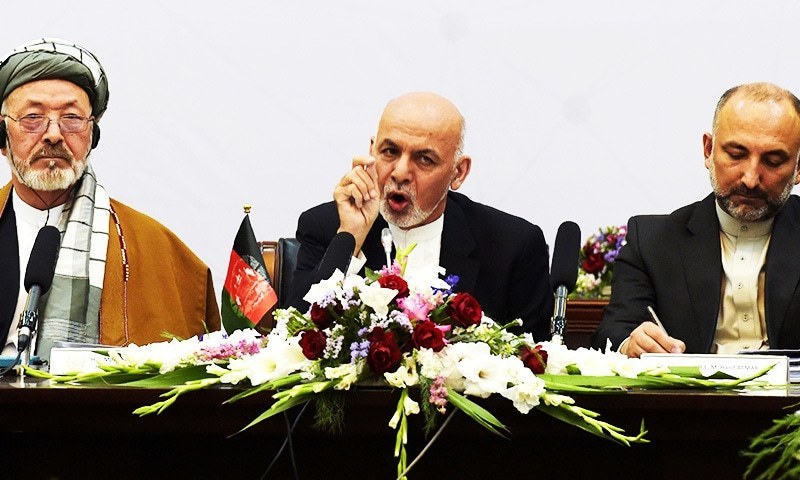The Peace Process: negotiations to start the negotiations
Talks between the Afghan politicians and civil activists on the one side and the members of the Taliban’s political office on the other side was to be held in early November in Dubai; however, the non-governmental organization of Afghanistan’s Peace Studies, the organizer of the process, has said that such negotiations in Dubai are delayed for the time.
Although the reasons behind the postponement of the negotiations are not clear yet, based on the statement of the organizer institution, this conference was not aimed at bringing the Afghan High Peace Council and the Taliban members around the one table.
Before this, some international organizations have facilitated the conventions of such gatherings in Japan, Germany, France, and some other countries, but none have produced any result.
A glimpse into the NUG’s peace policy
Since the formation of the National Unity Government (NUG), ending the Afghan war, strengthening the Afghan forces, and achieving peace were the primary elements of the country’s foreign policy. As an effort to achieve peace, the Afghan President began his travels from China, Saudi Arabia, and Pakistan and, to attract Pakistan’s attention to the peace process, gave many privileges to this country. Hence, Kabul mostly relied on Pakistan for its peace process. The Afghanistan-Pakistan-China trilateral meetings also commenced; its results being one of the Urumqi talks. In these talks efforts were made to include the Taliban in these talks because those who had participated in the Urumqi talks on behalf of the Taliban could not properly represent them.
In all the process of peace reconciliation with the Taliban, only the Murree talks were, somehow, a success for the NUG; however, due to the disclosure of the death of the Taliban leader Mula Mohammad Omar, this success did not take root. Later-on, the Quadrilateral Meetings between Pakistan, China, Afghanistan, and the US began; nevertheless, due to the Taliban’s denial to participate in these talks, these meetings also failed to open the way for the face to face talks with the Taliban. The two primary reasons behind the failure of this process was inviting the Taliban through Pakistan instead of properly inviting them and the announcement of the policy of taking actions against the Taliban if they did not take part in these negotiations. Although Pakistan accepted this policy in the Quadrilateral Meetings, it did nothing later.
The peace process must not be the victim of incidents!
Unfortunately, the past history proves that whenever there was a slight progress in the peace process, it has immediately become the victim of bloody incidents. In nowhere around the world, wars have stopped during the peace process but rather after the peace agreements. If the Afghan Taliban stop their war against the Afghan government and join the peace process, it would mean that the Afghan government also has to stop their fight against the Taliban and let them do what they wish wherever they want.
In the meanwhile, the Afghan Taliban must also realize the situation and, despite the Afghan government’s war strategy and the new US policy towards South Asia and Afghanistan, prepare themselves to join the peace process. For instance, during the long-lasted war of Vietnam, the war was continuing between the US and Ho Chi Minh forces and simultaneously peace talks were also going on, and at the end, the US forces withdrew from Vietnam after the Paris peace agreement.
Is the peace process really the process of peace?
Last month (October), the US war in Afghanistan entered its 16th year. This war was not only the longest war in the US history but also it was an unprecedentedly long war on behalf of the foreigners in the past 300 years of the Afghan history.
Although forming the peace-maintenance commission, the Afghan government officially started its peace efforts in 2005, 12 years since then, still the Afghan government’s progress in the peace process is equal to zero.
Still the Afghan government’s greatest wish is to bring the Taliban to the negotiation table that is why we say that this is not a peace process but rather the Afghan government’s effort to, somehow, bring the Taliban to the negotiation table.
It is really surprising that instead of seeking results through undertaking proper policies and building the bridges of trust, the Afghan government has mainly focused on forcing the Taliban to join the peace process.
Even after Trumps current policy towards South Asia and Afghanistan, the Afghan government must keep the peace process running and should not merely focus on the US policy because the past experiences show that it is impossible to achieve peace only through the war. Therefore, at a time that the US hegemony is declining in the region and the world, the number of US troops in Afghanistan has decreased, and the Taliban are stronger than ever in areas of both diplomacy and the war, the Afghan government must not stop the peace process.
The End

